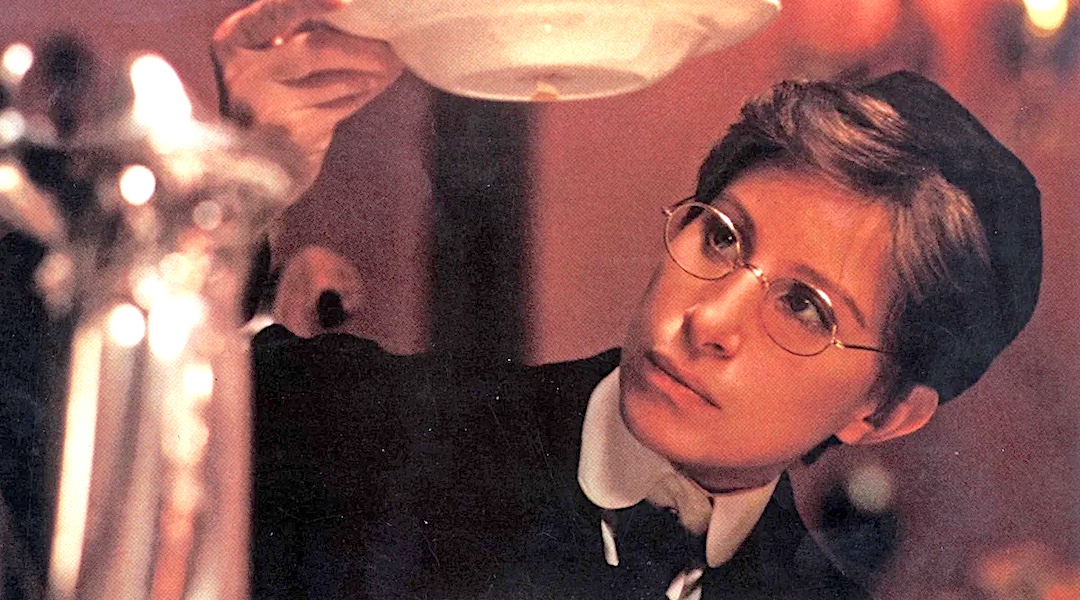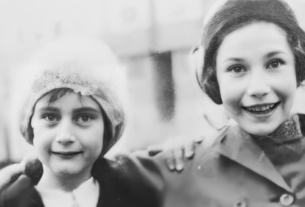In 1983, Barbra Streisand didn’t just break barriers — she sang through them and directed herself into the history books with “Yentl.” Since then, the gender-bending musical has continued to captivate audiences and resonate with a Jewish community where struggles for women’s equality and queer identity are still being fought.
And now The Neighborhood, a Brooklyn community center that blends the arts and pop culture with Jewish spirituality, will bring Barbra fans from all walks of life together on Feb. 26 for “Papa Can You Hear Me: A Spectacular Screening of Yentl,” featuring a performance by Simply Barbra, a Streisand drag impersonator.
During a night promising to blend cinema, show tunes and celebration of the legendary EGOT, attendees are encouraged to dress in Barbra or “Yentl”-inspired outfits. Steven Brinberg, who performs as Simply Barbra, will sing a few of Streisand’s biggest hits, and tell stories about the legendary star and about his experiences professionally impersonating her ahead of the film screening.
Martine Duffy, a program manager at The Neighborhood who uses they/them pronouns, told the New York Jewish Week that the time felt right to do a “Yentl” screening. Streisand turns 83 in April, and her 2023 memoir, “My Name is Barbra,” reignited cultural fascination with the star. They’re excited to add “glamor and antics” to the musical, but also to highlight an often unacknowledged part of the “Yentl” story: Streisand essentially becomes a drag king to portray a young woman impersonating a man.
“What Barbra Streisand’s character is doing is cross-dressing with a character and a performance in mind,” Duffy said. “We’re pulling that out and playing that up, and it’s also about celebrating New York’s queer Jewish artists.”
“Yentl,” based on a short story and play by the Nobel Prize-winning Yiddish author Isaac Bashevis Singer, follows a bookish Jewish woman in an early 20th-century shtetl in Poland who dreams of studying Torah. Women are banned from yeshiva study, so she does what any determined diva would: She chops off her hair, dons a suit and reinvents herself as a yeshiva boy named Anshel.
What follows is a whirlwind of Talmudic debates, forbidden romance and campy power ballads. Featuring Streisand’s flawless vocals — quoting Barbra quoting Steven Spielberg — “It’s the best film I’ve seen since ‘Citizen Kane.’”
For many queer, transgender and non-binary Jews, “Yentl” has long been a reflection of their struggles with identity — whether as a story of gender dysphoria, the fear of being outed or the liberation that comes from shedding community-imposed expectations.
Duffy first related to “Yentl” while growing up at a synagogue with a women’s balcony. It wasn’t until they were an adult that Duffy began to understand how subversive “Yentl” was, from Streisand being able to direct, write, produce and star in the film, to the film’s themes of gender fluidity and feminist empowerment.
“When coming of age into a queer identity and a Jewish identity, I realized that there’s a really powerful intersection between those identities and that one can kind of inform the other,” Duffy said. “Some parts of the Jewish world are closed to people who are not men and ‘Yentl’ kind of stands in for that. It’s really a story about self-determination and the idea of taking one’s identity into one’s own hands and finding a way to live the life that feels aligned with who you are on the inside.”
While the film’s protagonist is not sexually motivated initially, there is clear sexual tension between her and her study partner and best friend at the yeshiva, Avigdor, played by Mandy Patinkin.
Brinberg believes many queer people relate to the performance aspect — hiding one’s true self while experiencing awakening desires — while coming to terms with their sexuality.
“Yentl’s masquerade clearly mirrors gays having to hide and pretend who they are. When she sees Avigdor undressed and that awakens her, that could be many of us experiencing something similar for the first time, something hidden even to ourselves,” he said.
Steven Brinberg, left, performs as Simply Barbra, a tribute to the singer, actress and film director. (Courtesy Steven Brinberg)
Shoshana Gottlieb, an Australian self-proclaimed “friend of Yentl” and owner of @Jewishmemesonly, initially watched the film because of the Jewish aspects of it; when she returned to “Yentl” in her early 20s, she became enamored with the musical.
“It was just like the most revelatory text that I had at my fingertips. It’s not just the queerness, but also the Jewishness and the yearning to be closer to God and to Judaism through whatever angle you can be,” Gottlieb told the New York Jewish Week.
Streisand took inspiration from Singer’s source text, but toned down what she considered the author’s misogyny and added a feminist twist to her version, allowing Anshel to teach his wife Hadass Torah, just as Yentl’s father taught her.
“Barbra is writing in a time and context where she’s a woman fighting for a place in a man’s world. And I think that her shift towards the feminist angle of the story of ‘Yentl’ is a valid interpretation,” Gottlieb said.
The fight in “Yentl” for equal opportunity is one seen in the real-life struggle to get the film made. Streisand had to fight to direct the movie, becoming the first woman to earn a Golden Globe for directing as a result.
Debates have surrounded Streisand’s adaptation. In Singer’s original, Yentl remains Anshel indefinitely, fleeing to a new yeshiva for a life of study and prayer as a man. In the film, she ultimately chooses to leave for the United States as a woman. Singer disavowed Streisand’s version, claiming she entirely missed the point of his story.
A 2024 Yiddish adaptation of “Yentl” at the Sydney Opera House leaned into the queerness of the original, which Gottlieb called “the most incredible thing I’ve ever seen.” Still, she maintains that Barbra’s version — though arguably “the least queer of all of them” — is still inherently queer.
For Duffy, one of the reasons they love Streisand is because she has never hidden her Jewishness. Streisand has publicly discussed all the learning she did with rabbis and cantors to prepare for the role of the young yeshiva student, relating that back to her father Emmanuel Streisand, who was a Jewish educator.
Brinberg is thankful to “Yentl” for giving Jews the ability to see themselves on screen in a film other than a Holocaust drama. Specifically, he appreciates how Streisand cast Jewish actors — in addition to Streisand and Patinkin, the cast includes Amy Irving as Hadass and the late Nehemiah Persoff as Yentl’s father — providing authentic Jewish representation.
“It’s a rare movie about us as people and our hopes and dreams. Jews may be well represented behind the scenes but we are still lacking in a huge amount of films and TV shows literally about us,” he said.
After over 40 years, the messages behind “Yentl,” no matter what interpretation of the film one takes, still resonate with many Jews. In Orthodox communities, women are rarely offered the same access to Torah learning as men, and queer people have struggled for acceptance. While Orthodox feminists and LGBT people have counted successes — institutions like Nishmat, Maharat and Drisha offer high-level Torah learning for women, and attitudes toward queer Jews have been loosening somewhat, mostly in Modern Orthodox circles — in many cases they are forced to leave their communities to follow their dreams and live authentically.
“We’re still fighting the same fights that we’ve been fighting for longer than 40 years. You don’t need to reinvent the wheel because it encapsulates so many feelings of yearning and a desire to belong in such a beautiful way,” Gottlieb said.
Especially as queer and transgender rights are under attack in many parts of the United States, Duffy underscored the importance of The Neighborhood’s commitment to building a community for LGBTQ+ Jews in Brooklyn and to continue telling Jewish and queer stories.
“This is a time when both queer folks and Jews are hurting. So it felt like something celebratory and joyful and fun was really needed, and we felt that ‘Yentl’ would be the perfect vehicle for that,” they said.
Brinberg said he is always enthusiastic about performing in Streisand’s home borough of Brooklyn — and touts the honor of singing at the Barclays Center one month before the star returned to Brooklyn in 2012
“Hopefully, people will be sympathetic that it won’t have the lights and sound like a concert hall,” he joked. “But I’m sure it will be a blast!”
The Neighborhood presents “Papa Can You Hear Me: A Spectacular Screening of Yentl,” on Feb. 26, at 7:00 p.m. at Film Noir Cinema, 122 Meserole Ave, Brooklyn. Tickets are $18 (of course).
Jewish stories matter, and so does your support.




